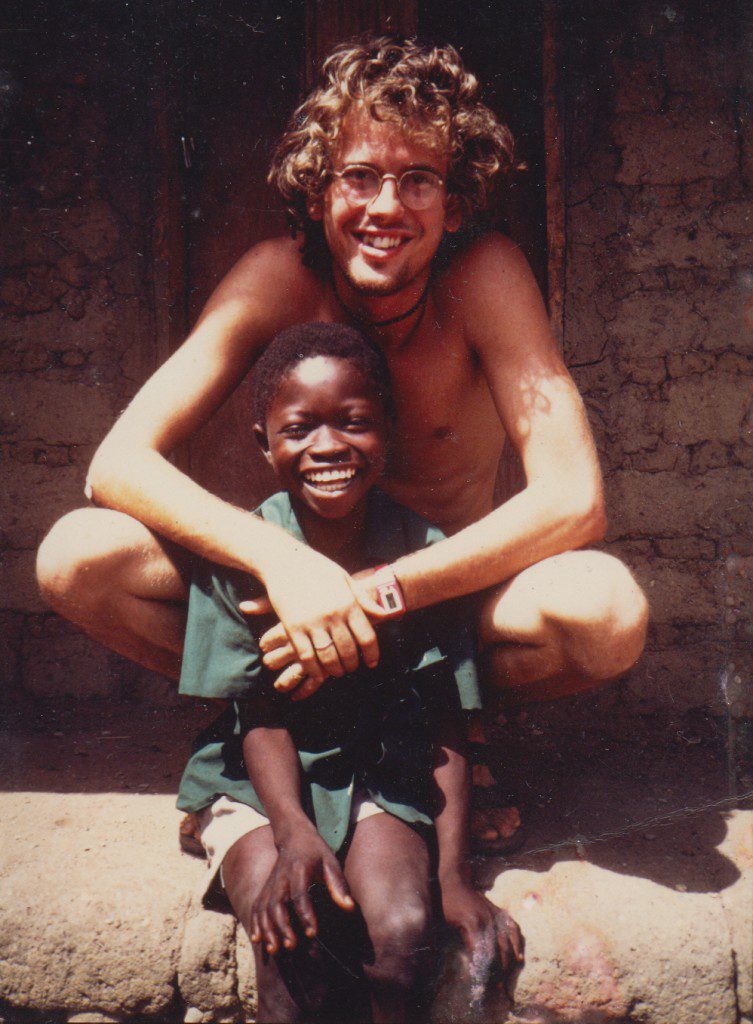 Tell me how you got started.
Tell me how you got started.
Really, I got started by being the fifth of ten children. Being in the middle meant that I was always seeking harmony in the family.
In terms of peacebuilding, from 1985 to 1989, I served as a Peace Corps volunteer in Sierra Leone and that was big initiation for me. I lived in a small, remote village with a population of approximately 3000, with no electricity, no running water. That experience challenged my sense of what is needed to be happy. My friends lived on less that $1/day and yet they seemed more connected to happiness, joy, music, nature, and the Earth.
When I came home to the United States, I saw the impact of global economy and how the American lifestyle was directly affecting people in Africa. AK-47s, the weapon of choice in Sierra Leone’s civil war, were being bought with blood diamonds, the symbol of everlasting love. Child soldiers were being trained by watching Rambo movies. Actions that people were taking in the US and products we were distributing were having highly negative impacts on people around the world. In the US, I saw a deep sense of emptiness, fueled by consumerism, having a ripple effect around the world. This is what took me on a path of spiritual discovery.
In 1998, while I was working with Search for Common Ground on peacebuilding projects, I had the opportunity to go back to Sierra Leone. I visited the area where I’d lived ten years earlier and heard horrific stories from friends about the war. On my way back from the village where I’d lived, I saw a mob killing. The war followed me back to Washington, DC, where soon after my return, the New York Times carried a photo of a Sierra Leonean woman who had had both her arms cut off. She was from the area where I had lived. The war was devastating. The UN finally came in.
Right around that time, I started to meditate and have mystical experiences of divine love. These experiences helped me work through all the violence I had witnessed. But I also had an ecstatic experience right after the coup attempt. I wondered how these two extreme opposites, devastating war and mystical love, could be compatible?
What interests you most about what you’re doing now?
Well, I wrote a (bestselling!) book, God and Conflict, about these two worlds, divine love and human treachery. The book goes into the heart and soul of inner conflicts and maps my search to find peace in a world of dramatic duality. This journey took me to India and Nepal. I participated in spiritual initiations in which parts of myself were burned away. While I was with SFCG, I also saw peacebuilding missions teaching principles that I was learning in meditation being used to transform society.
I discuss some of these principles of inner and outer peace in God and Conflict:
– Embrace conflict as natural and peace as our birthright
– Remember the golden rule (do unto others as you would have other do unto you) and your culture’s natural laws (i.e. “what goes around comes around”)
– Witness and observe: respond instead of react
– Listen
And more…
There is a whole chapter focusing on conflict as a part of life. How is that true from a meditation perspective? Duality is needed to have physical reality. Conflict when approached constructively can become a driving force to bring a person into union with one’s Self, it can be an opportunity to go deeper in relationship, move beyond polarity. It requires a recognition of interconnectedness, interdependence, deep love, being able to look inside and outside. It’s not easy and is a lot of work
What’s been your biggest accomplishment?
Being to be part of Search for Common Ground after the war in Sierra Leone.
On a more personal level, being able to be present with people, no matter who they are.
Who or what inspires you?
Paramahansa Yogananda, my family and friends.
Yogananda is my spiritual teacher.
My parents raised 10 kids and picked up one more son when his parents died. They put everyone through college. That’s an amazing feat.
I’m also inspired by all the incredible peacebuilders I’ve met all around the world. They are people doing phenomenal work.
Why is peace sexy to you? What does “Peace is Sexy” evoke for you?
The aliveness of bringing the inner out into union with others.
What is a simple thing you do to create peace? What is something you do everyday?
I am present with people. For example, a neighbor of mine, an old man, was recently told he only has a short while to live. I try to spend as much time with him as possible.
How would you like Peace is Sexy to make a difference in what you are up to?
Invite people to participate. Buy the book and participate with the community that’s created around the book. Take in God and Conflict and the other gifts being offered. Commit to being gentle to yourself while continuing to learn.
Where would you like to see your passion go in the next 10 years? 20 years? 100 years?
I see myself moving to a deeper state of inner peace and allowing that to flow out through speaking, teaching and continuing with peacebuilding initiatives anchored in deep sense of inner peace.

